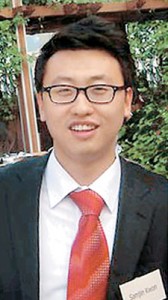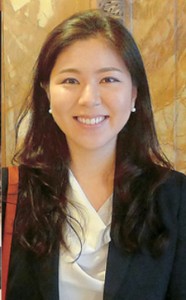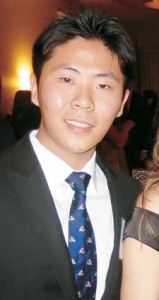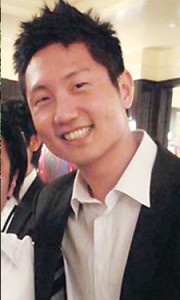- California Assembly OKs highest minimum wage in nation
- S. Korea unveils first graphic cigarette warnings
- US joins with South Korea, Japan in bid to deter North Korea
- LPGA golfer Chun In-gee finally back in action
- S. Korea won’t be top seed in final World Cup qualification round
- US men’s soccer misses 2nd straight Olympics
- US back on track in qualifying with 4-0 win over Guatemala
- High-intensity workout injuries spawn cottage industry
- CDC expands range of Zika mosquitoes into parts of Northeast
- Who knew? ‘The Walking Dead’ is helping families connect
Want to become a lawyer in the U.S.?

Sam Kwon
● Kirkland & Ellis LLP’s New York office
● J.D. from Duke University Law School
● B.S. in Chemical Engineering from Brigham Young University
● Born in Korea. Moved to the U.S. in middle school
Four Korean American attorneys give advice
By Kim Da-ye
Since the global financial crisis in 2008, law school grads have found it tougher to get a job as an attorney in the already competitive U.S. job market.
Chae Yoon of Baker & McKenzie LLP, Vivian Choi of Shearman & Sterling LLP, Sam Kwon of Kirkland & Ellis LLP and Yu Jeong-seok at Simpson Thacher & Bartlett LLP share several things in common.
The young lawyers in their late 20s or early 30s graduated from top law schools in the U.S., grew up in more than one country and developed communication skills that enable them to work in the international environment.
Chae, Choi and Kwon met during a summer internship program at a leading Korean law firm, and Yu got to know Chae and Kwon through Choi.
In their second year at their law firms as associates, they shared with The Korea Times what it took them to start a career in law in the U.S. and what their lives as attorneys are like.
The interview was edited.
Q: What made you want to pursue a career in law?
A: Choi : I grew up with the dream of becoming a diplomat negotiating treaties and agreements for Korea. I studied international relations in college and graduate school, and interned in the Korean foreign ministry and the World Trade Organization. During that journey I realized that having a legal background would be important for what I wanted to do. Whatever policies we want to effect through government or change we want to see in society, much of it begins with the negotiation of legal documents and is further implemented within a legal framework.
Kwon: As an engineering student in college, I didn’t consider law as a career option until I attended a seminar discussing patent law and patent lawyers in my junior year. I found the interface of science and law to be very appealing and started to prepare for law school admission that year.

Vivian Choi
● Shearman & Sterling LLP’s New York office
● J.D. from Harvard Law School
● B.A. from Ewha Womans University and M.A. in International Relations from Yale University
● Born in Korea, brought up in Korea and the U.S.
Q: What advice would you give to people who are preparing for law school, and for those who are entering law school?
A: Chae: I would advise them to first determine whether they really want to go to law school. A traditional J.D. program in the U.S. takes three years to complete and it can be quite a financial burden. Such commitment should not be taken lightly, especially in view of today’s competitive legal market.
As for law school applications, I would say an applicant’s LSAT (Law School Admission Test) score and GPA are probably the two most important factors. But law schools take many other factors into consideration, such as the applicant’s personal statement, community service experience and letters of recommendation.
Choi: I’d say there is no rush trying to start law school as soon as possible. I am glad I did my graduate studies and internships to figure out whether going to law school was the right step. I would advise students coming out of college today to take greater risks than I did and explore what’s out there when you are young — be part of a start-up, live in a different country, try internships.
Yu: The landscape has changed quite a bit, and the legal market has become somewhat saturated, particularly after the financial crisis. Many people are initially drawn to corporate law because of their interest in business, but fail to take into consideration that the bulk of the corporate legal work often involves working closely with long, mammoth corporate contracts and long hours working in teams. I would advise that people who are considering law school talk to a range of law school graduates with diverse careers and learn about what the day-to-day lives of these lawyers are like.
The research and thinking process is also important in preparing to be in law school. It is easy to get caught up in the whirlwind of busy law school classes and finding summer internships, and to follow the crowd in terms of what most of your classmates are pursuing.

Yoon Chae
● Baker & McKenzie’s Dallas office
● J.D. from University of Michigan Law School
● B.S. in Electrical Engineering from University of Texas at Austin
● Born in Korea, brought up in India and Singapore
Q: How has your major in college helped you in pursuing a career in law so far?
A: Choi: I think college is a time to explore who you are and how you can make a contribution to society, and also the time to probe into philosophical questions and to study literature and art history, just for the fun of it. Besides, nothing can really prepare you for that first year in law school.
Kwon: I studied chemical engineering in college. I expected a huge culture shock going from engineering to law school, but I found engineering and law to be surprisingly similar in that both disciplines require rigorous analytical thinking.
On a more practical level, as a patent litigator, I deal with complex scientific concepts every day, and my engineering education has been a huge help in digesting these concepts.
Q: What do you think are the important qualities for having a career in law?
A: Chae: Writing skills are paramount. I feel that being able to write cohesive and concise arguments is extremely important for attorneys. Fortunately, this can be honed through practice, and while I still have much to learn, my writing has definitely improved since attending law school. Also, having great mentors at Baker & McKenzie has helped me tremendously.
Choi: I’ve found that having communication, organization and management skills is extremely important. It’s hard to stay afloat as a law firm associate without these skills. A large part of being a corporate attorney is managing the transaction process. Just getting more deal experience helps with management skills since you get better at anticipating steps and you start to see how different pieces of the transaction fit together.
Kwon: Because patent law requires the communication of complex scientific ideas and legal principles, excellence in writing and analytical reasoning is critical. The best way to improve these skills is to practice as much as possible. In law school, I tried to take as many writing classes as possible, and now, I actively seek out assignments that require the use of these skills.
Yu: On top of these skills, you also need leadership skills. Your clients rely on you with a wide range of perplexing or multidisciplinary issues. You need to synthesize the responses from the team members from different areas of expertise, and then provide coherent answers that are tailored to your clients’ needs. Having the skills to synthesize cogent and practical solutions based on incomplete information is an essential part of the job.

Yu Jeong-seok
● Simpson Thacher & Bartlett LLP’s New York office
● J.D. from Harvard Law School
● B.A. in Psychology and Economics from Yale University. Served
as the president of the Korean International Student Organization
Q: After graduating from law school, what kind of professions can you go into? Why did you choose working at a law firm?
A: Choi: I chose to work at a law firm on the advice that I would receive the best legal training I could get right out of law school. I have several associates and partners who supervise and review my work at all times. In addition, by being part of a deal team, you get to see up-close your senior associates and partners in action and learn from them. Feedback is also immediate from both within the law firm and from the client, and you usually have another transaction up next to give you the opportunity to put into practice all the things you learned yesterday.
Yu: Law degrees and experience in a big law firm in New York would help you develop a set of skills that are applicable in a number of different fields. A number of attorneys who leave law firms after a few years capitalize on the training and take on major, meaningful positions in the government, finance, large corporations or even at start-ups.
Q: Where are you licensed, and why did choose to be licensed there?
A: Chae: I am licensed in Texas. I started my career in Dallas because of its abundant opportunities — opening of a satellite United States Patent and Trademark Office, presence of a strong technology sector and its well-known ties to the Eastern District of Texas, which continues to be the most popular place to file patent lawsuits in the U.S.
Yu: New York. Cross-border transactions are part of the bread and butter of New York law firms in general, so it was a natural choice to seek out a firm in New York such as Simpson Thacher from the outset.
Q: Which practice area do you work in?
A: Choi: I am currently in the corporate group. Shearman & Sterling’s New York office has a two-year corporate pool program where junior attorneys receive assignments from the various corporate groups — M&A, finance, capital markets to name a few. As a result, I can be working on four or five completely different matters on a daily basis.
Yu: I am currently working in the firm’s corporate department. I have been involved in a number of mergers, acquisitions, asset-based lending, unsecured lending and public offerings of various debt and equity instruments.
Q: Do you think your international or Korean background helps you at work?
A: Choi: When working with colleagues and clients from all over the world, I think it’s especially important to have an open mind, to be aware of how your actions may be perceived differently in other cultures, and to understand how others might also view things differently from you.
Yu: Language skills are definitely a plus as well.
Q: What aspects of being a lawyer do you enjoy? What are the challenges? How do you cope with them?
A: Choi: The best thing about the job for me is that I get to learn new things every day. But the flip side of that is the stress of juggling so many different priorities at the same time. I make a point of trying to eat a meal with my husband whenever I can — whether it’s getting a coffee together on my way to the office in the morning, or meeting in front of the office for a 20-minute dinner and then going back to work.
Yu: Regulatory environments and business landscapes change rapidly, and it’s necessary to take into account all of the information out there to guide clients. It is surprisingly helpful to keep abreast of the current issues by reading newspapers and magazines. Another challenge of my job is the challenging aspect of working with multiple supervisors on various deals that often move unpredictably.
There is only so much you can do about this, but I try to be proactive in setting up an organizational system at the outset so it is easier for me later on, as well as checking in regularly with those who manage me.















